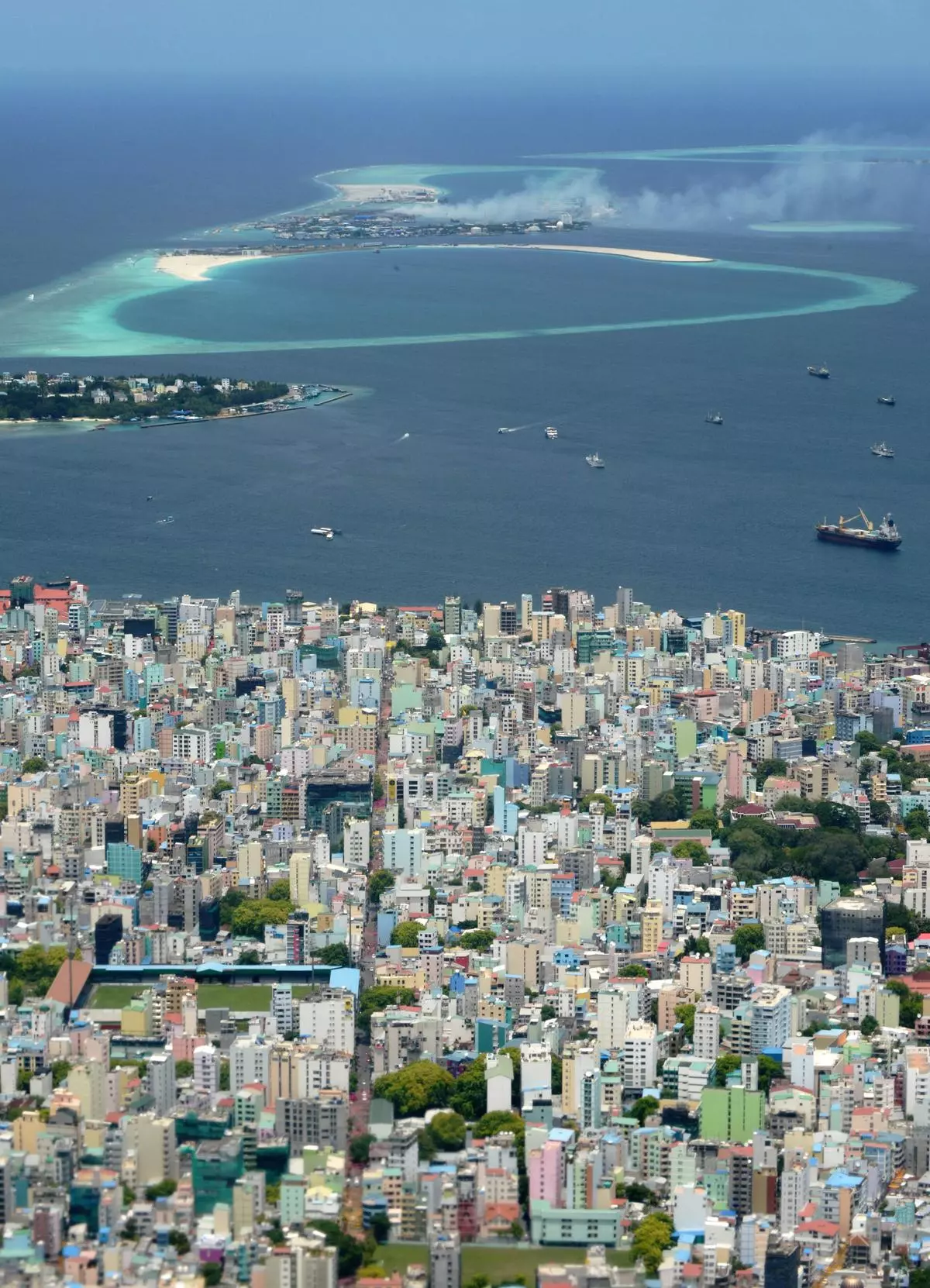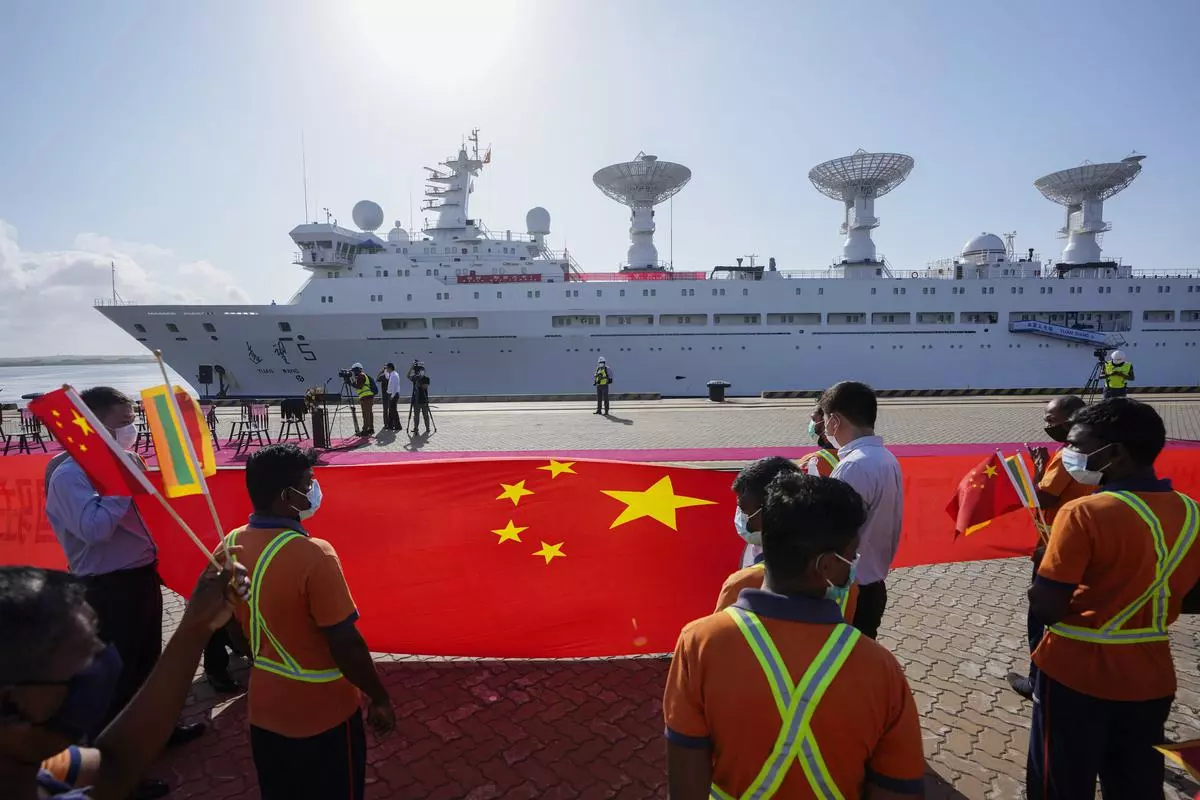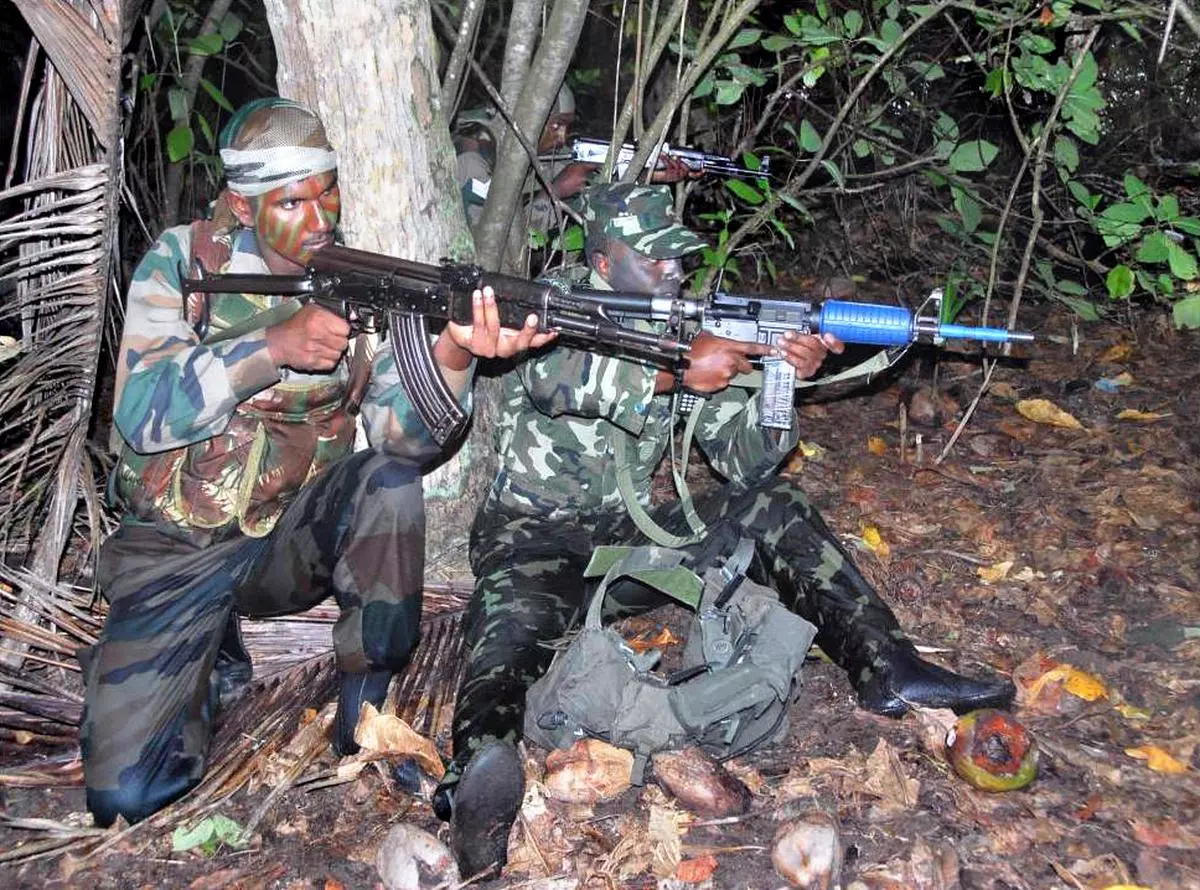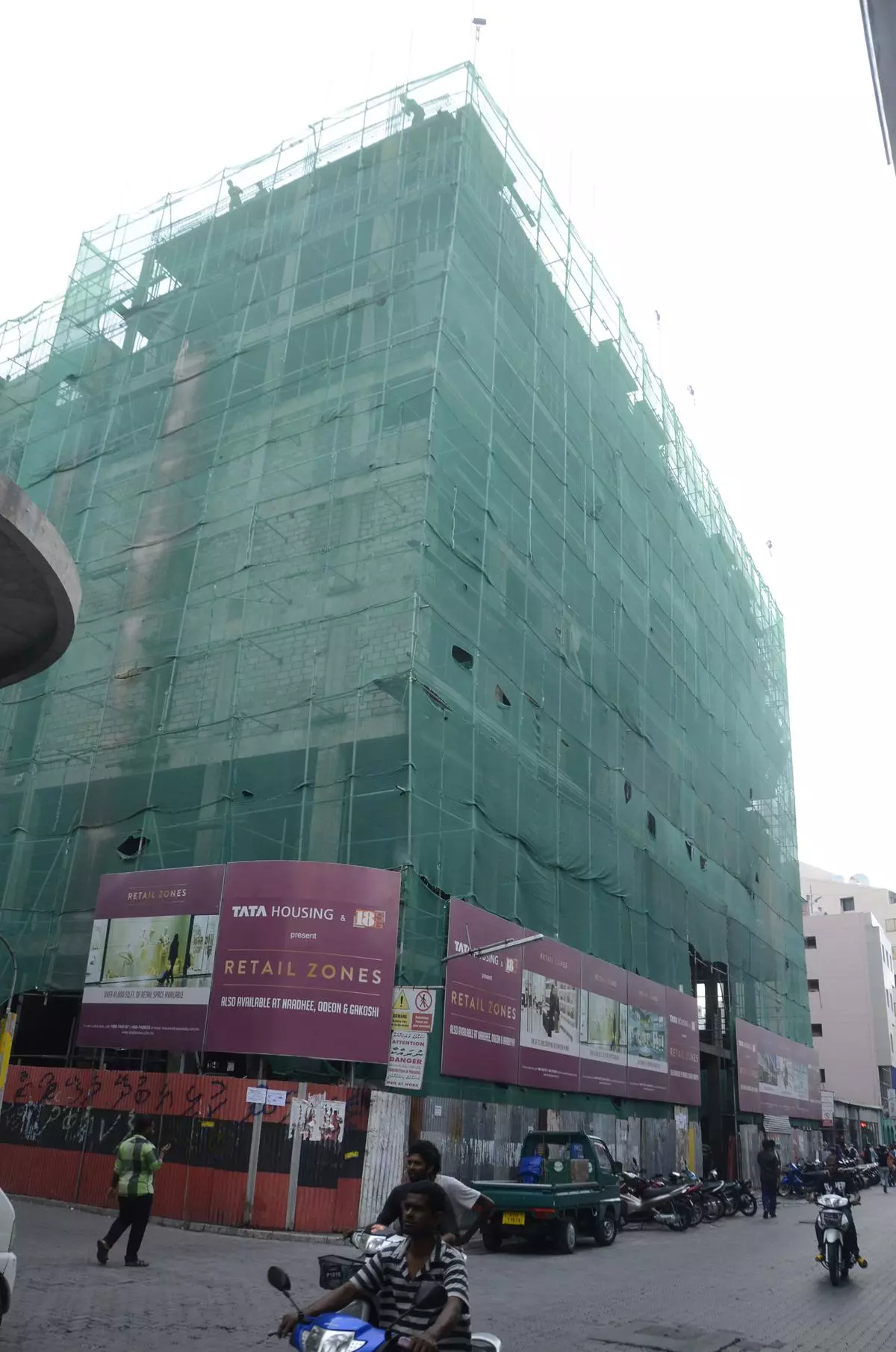
The Sinamale bridge in the Maldives capital, Male, was built with significant funding from China. | Photo Credit: AFP
The Bharatiya Janata Party (BJP) government rightly claims credit for popularising yoga across the world. Ironically, one such show in Male, the capital of Maldives, in 2022, led to a series of events that culminated in India losing its toehold in the strategically important archipelago nation. China has now occupied that space.
The story begins in the second quarter of 2018 when President Abdulla Yameen, leader of the Progressive Party of Maldives (PPM) and a self-declared friend of China, decided to call for the presidential election. His calculations were clear: he had ensured that former President Mohamed Nasheed, of the Maldivian Democratic Party (MDP), the main opposition party, could not run for office because he was a convict on the run and was hiding in Colombo. Besides, there was no other charismatic leader in the MDP. Yameen thought he would breeze through.
Unfortunately for him, all the major political parties in Maldives decided to come together in a bid to oust him. Nasheed was adamant on contesting, and it required the skills of expert negotiators from within and outside the MDP, to convince him that it was better to look for a consensus candidate. Nasheed agreed, with conditions, and selected Ibrahim Mohamed Solih to run for President. Solih was his close friend, who had been a lackluster Member of the People’s Majlis [parliament] for nearly two decades.
Also Read | Maldives presidential run-off: Pro-India candidate Ibu Solih loses election
Solih won the election, despite the capture of all democratic institutions by Yameen. One Yameen aide told Frontline that he was in a state of shock. Soon after, the Solih government brought charges against him on several counts, including corruption and embezzlement. Realising that he could be in significant trouble, sometime in late 2020 Yameen launched an “India Out” campaign, which, at that point, was only a diversion tactic. The core of the campaign required India to take back its military personnel stationed in Maldives. In the initial days, the campaign barely had any traction. But the Solih government outlawed it and this overreaction gave the campaign a slight boost.
Yoga Day row
The real shot in the arm came in June 2022 when the Indian High Commission in Male, on the basis of routine instructions from the Indian Ministry of External Affairs, decided to celebrate International Yoga Day in a massive way. No one in New Delhi thought that a yoga campaign in a 100 per cent Sunni Muslim country would create a problem. Such was the lack ofattention to detail when it came to dealing with India’s neighbourhood, despite India’s professed “Neighbourhood First” policy.
On June 21, 2022, Reuters reported that “a crowd stormed the stadium” where the event was on, and police had to use tear gas and pepper spray to control the situation. More importantly, the report said that “the protesters brandished placards proclaiming that yoga was against the tenets of Islam”.

An aerial view of the island of Male and nearby Thilafushi Island (top). There was an unwritten understanding that the Male-Thilafushi project would be awarded to China after Yameen came back to power. | Photo Credit: Roberto Schmidt/AFP
In Maldives, no leader, barring Nasheed, has tried to take on the Islamic fringe. The “success” of this disruption laid the foundation for the campaign theme for the 2023 election. Anti-India rhetoric was one of the campaign points of the PPM from then on. The PPM’s sometimes wild propaganda was also helped by the many events of Muslims being targeted in various States in India. One political party representative said that every single reported event of an attack on Muslims in India was ammunition for propaganda in Maldives.
Yameen was jailed for 11 years for corruption and embezzlement (he had apparently diverted money to his own account), and hence, he could not run for President. Mohamed Muizzu, who was a PPM Minister until 2018, switched at the right time to the People’s National Congress to gain the presidential nomination from that party. In contrast, Mohamed Waheed Hasan, a former President, who remained with the PPM hoping to get the party’s nomination, was left high and dry. Muizzu’s move was astute because he was aware that Yameen would not allow anyone in the PPM to contest for the post.
Lacklustre governance
Clearly, the Maldivian election was more than an India versus China battle: both India and China were only part of a larger narrative that shaped the election campaign. Ibu Solih’s governance was lacklustre, and his decision to incentivise people of the island of Male to move to the newly created Hulumale island led to charges of nepotism and favouritism. Besides, his fight with Nasheed occupied more space and time than issues of critical importance. In short, local issues played a large part in sinking Ibu Solih.
It is in this context that the 2023 election needs to be viewed. China’s “string of pearls” strategy to encircle India is one more step closer to becoming a geopolitical reality with the electoral defeat of the India-leaning Solih in the September 30 run-off election. String of pearls refers to a series of ports and allied facilities that extend from the Chinese mainland to the port in Djibouti in the Horn of Africa. The facilities in the Indian Ocean Region—Gwadar (Pakistan), Hambantota (Sri Lanka), Chittagong (Bangladesh), and Sittwe (Myanmar)—effectively encircle India. China claims that this deployment is to protect its trade interests.
In South Asia, Pakistan was the first to join the Chinese development and infrastructure plan in 2013. Sri Lanka and Maldives followed suit in 2014, with the development of the Hambantota Port and the Sinamale bridge respectively. Myanmar and Bangladesh joined China’s Belt and Road Initiative (BRI) in 2016, and Nepal in 2017. Ports or allied facilities that China has developed in all these countries have helped it gain a hold in these countries and thereby encircle India despite the fact that China vehemently protests any such insinuation. While this was not a “done deal” until even a few years ago, recent developments in Maldives, and the problems in Sri Lanka and Nepal have added to China’s heft in the region.
Removal of Indian troops
One of the first pronouncements of President-elect Mohamed Muizzu, who became the default candidate of the China-leaning PPM, indicated that he wanted Indian troops out of Maldives. Though Nasheed attempted a clarification so that the outside world perceives Muizzu’s pronouncements as not harsh, he was called out by Muizzu’s close aides, and the PPM asserted yet again that it wanted Indian military personnel out. Muizzu now wants Indian military personnel out in a week after he takes charge.

Sri Lankan workers hold the Chinese flag to welcome the Chinese research ship Yuan Wang 5 as it arrives at Hambantota International Port in Sri Lanka in August 2022. China’s Belt and Road initiative has built power plants, roads, railroads, and ports around the world and deepened its relations with Africa, Asia, Latin America, and West Asia. | Photo Credit: Eranga Jayawardena/AP
Asked about this development, Commodore (Retd) R.S. Vasan, Director General, Chennai Centre for China Studies, told Frontline: “If the last few years saw a pro-India Government in Maldives, it would now be the turn of China to replace India. However, India has been and will be the first responder in the event of any contingency as in the past. China would like to consolidate its position in IOR [Indian Ocean Region] to wield economic, political, and strategic influence.”
On the question of how India should deal with its defence personnel stationed in the archipelago nation, he said that India should be pragmatic and be seen as helping the new President. “India should voluntarily withdraw its defence personnel before they are asked to leave. That the ongoing Indian-aided projects would not be affected allows some leeway in demonstrating our goodwill by timely completion of the projects and earning the goodwill of people,” he said.
Indian projects in trouble?
But the Indian projects going ahead might not be a done deal. An insider who was part of the government about a decade ago said: “The wide Boduthakurufaanu Magu [the road from the head of the Sinamale bridge to the other end of Male island] was a gift from China. The unwritten understanding was that the Male-Thilafushi project will be awarded to China after Yameen came back to power.” Right now, Afcons Infrastructure, an Indian company, has begun work on the project. Because of the COVID years, work has not progressed as desired. The Tata group’s residential project on Ameeru Ahmed Magu is also proceeding at a steady pace, but there are concerns over this project too.
A stark contrast in the difference of opinion between India and Maldives can be seen in the reactions to the unfolding horror in West Asia. Until the BJP came to power, India and Maldives were on the same side in most West Asian conflicts. This has changed significantly. Both Muizzu and Indian Prime Minister Narendra Modi did not mince words—and were on opposite ends of the spectrum.
Muizzu tweeted on October 7: “Israel should end the illegal occupation of Palestine immediately and return the lands forcefully seized from Palestinians. Israel should recognise Palestine as an independent state with East Jerusalem as its capital within 1967 borders and allow the immediate return of refugees.” Muizzu’s home in Male sports a massive Palestinian flag with the words “free Palestine” written across it. Going by reactions in Maldives, people across the political spectrum there are on the same side.
Modi tweeted in support of Israel, in no unequivocal terms, on October 7: “Deeply shocked by the news of terrorist attacks in Israel. Our thoughts and prayers are with the innocent victims and their families. We stand in solidarity with Israel at this difficult hour.” While the Indian MEA tried to balance it out with a statement in support of Palestine, the lack of outright condemnation has not gone unnoticed in both Male and in Dhaka—until recently, two important Indian allies in the neighbourhood. After the al Ahli hospital bombing, Modi’s post on ‘X’ (formerly Twitter) did not help matters. He condoled the deaths and said: “Those involved should be held responsible.” This is different from the US position on the issue (that Israel did not do it). This stand did not assure the Arab world or win any brownie points with India’s friends in the Global North.
Regardless of the recent dissonance at the top levels of governance in India and Maldives, two persons in positions of power said that India had five years, from 2018 to 2023, in which to influence the course of how Maldives moved forward but it prioritised short-term gains instead of long-term achievements. “It was not easy to make Nasheed agree not to contest [in 2018]. That was achieved. Everyone knew that Nasheed will not be able to keep quiet. If Nasheed and Solih had been together, the election would not have been such a cakewalk,” said one leader. “Like Sri Lanka, Maldives is in China’s corner for a second time because Delhi did not do enough,” the other leader claimed.
Highlights
- In 2022, a seemingly harmless celebration of International Yoga Day in the Maldives turned into a geopolitical nightmare for India.
- The incident saw protests and accusations that yoga was against Islamic principles, triggered a series of events.
- These events culminated in India losing its strategic influence in the archipelago nation, paving the way for China to assert its dominance.
Embracing China
What unfolded in Maldives is, in many ways, the blueprint of how countries in the region have slipped out of India’s sphere of influence and embraced China. In 2015, when a regime change was effected in Sri Lanka, the repercussions were felt not just in Sri Lanka but also in Nepal. In 2017, the Communist Party of Nepal (Maoist Centre) led by Pushpa Kamal Dahal “Prachanda” and the Communist Party of Nepal (Unified Marxist-Leninist) of K.P. Sharma Oli suddenly announced that they were coming together. Soon after the 2017 Nepal general election, the two parties merged. However, by 2021, the party split into two entities once again.
China had a role in these developments, as well as in Nepal putting out a map showing some regions in India as part of Nepal. Relations between India and Nepal have never been the same since the India-enforced blockade of essential supplies by the Narendra Modi government in 2015 for six months, in response to Nepal adopting a new Constitution and moving away from being the world’s only Hindu nation to a secular country (India had also cited other reasons for the decision).
Comments about the blockade have come up in every single interaction this correspondent has had with Nepali leaders and intellectuals since then. Nepal putting out a map that showed some portions of India as part of that country was seen as defiance stemming from the fact that it had China in its corner.
One source said that China presented Bhutan with a tempting offer in border talks in January 2023: in return for Bhutan not disputing China’s claims in the west (Doklam) and the east (Arunachal Pradesh) of the landlocked country, China was willing to give up claims on two disputed regions in the north, where a few of Bhutan’s sacred sites are located. While a final agreement is some distance away, a “three-step” road map appears to indicate significant progress, according to a January 2023 issue brief of the Institute of South Asian Studies, National University of Singapore. The brief also adds a caveat: “It is hard to imagine Thimphu agreeing to any boundary-related deal with Beijing that concerns New Delhi.”
As in the case of the China-built Sinamale bridge in Maldives, which transformed the country, the Padma bridge in Bangladesh, which was inaugurated in 2022 and connects a large part of the south-west of the country to Dhaka, promises to be a game changer. This bridge, built with Chinese assistance, and Bangladesh’s main port at Chittagong, are part of the country’s critical infrastructure. Chinese assistance in both projects is an indicator of China’s influence in Bangladesh.
China is everywhere
In Sri Lanka, Chinese presence is visible everywhere. It has already taken over Hambantota airport on a long-term lease after the island nation defaulted on loan repayment, built an island off Colombo, and has developed a large part of Colombo Port.

A joint military training exercise being conducted between the Indian Army and the Maldives National Defence Force at Maafilaafushi, Maldives, in 2015. | Photo Credit: The Hindu Archives
While not commenting directly if the string of pearls has been accomplished, Vasan, who served with the Indian Navy and commanded the Eastern Region of the Coast Guard, said that India would have to rework some of its strategies. “Maritime equations will continue to be challenged with a pro-China slant as during Yameen’s regime. Some of the efforts for enhanced maritime domain awareness by partnering with Maldives may come undone. So, it will be a testing time in the maritime neighbourhood. India also needs to engage with the people with whom historical and cultural relations have had deep influences,” he added.
Also Read | Sinamale Bridge: A symbol of transformation in the Maldives
The warning that China was trying to encircle India is at least a decade old, but the policies of the Indian government in the past decade have accelerated that process and left Indian security in a state of greater anxiety. In February 2022, stung by Congress Lok Sabha Leader Adhir Ranjan Chowdhury’s remarks that India’s neighbours were being distanced, BJP national vice president Baijayant Jay Panda tweeted, “Rajiv Gandhi facilitated China’s String of Pearls” but now “in seven years our India First policy has pushed back.” He made several other claims about Sri Lanka and Maldives. Just over a year later, all his assertions have proved to be untrue.

A Tata Housing residence-cum commercial complex being built in Male in 2012. | Photo Credit: R.K. Radhakrishnan
Boosting alliances
The Global North hopes to counter Chinese influence in the region by boosting its alliances in the region, such as Quad, of which India is a part. India, too, has formed regional alliances outside the South Asian Association for Regional Cooperation (to keep out Pakistan), such as Security and Growth for All in the Region (SAGAR), the Indian Ocean Rim Association, and the Bay of Bengal Initiative for Multi-Sectoral Technical and Economic Cooperation.
There is an even more fantastic proposition being put forth by right wing supporters in India—a necklace of diamonds to counter China’s string of pearls. In this action, the “necklace” stretches from Seychelles via Oman (Duqm) and Iran (Chabahar) to Mongolia, Japan, Vietnam, Singapore and Indonesia.
Just as in the case of Chinese incursions in India, the Indian government and the ruling BJP seem to be more keen on controlling the media narrative than actually working towards countering Chinese influence in the region. And therein lies India’s problem.
 And India has lost its strategic influence in the archipelago nation.
And India has lost its strategic influence in the archipelago nation.